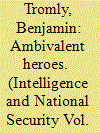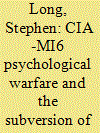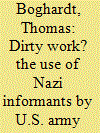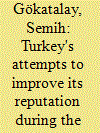|
|
|
Sort Order |
|
|
|
Items / Page
|
|
|
|
|
|
|
| Srl | Item |
| 1 |
ID:
159932


|
|
|
|
|
| Summary/Abstract |
This article uses recently declassified CIA documents to examine Soviet defectors of the 1950s, with a focus on US programs to court, receive, and utilize defectors against their homeland in espionage and psychological warfare operations. Eschewing the tendency at the time and in later scholarship to emphasize defectors’ ideological motivations, the piece argues that defectors often crossed over the Iron Curtain for reasons of self-preservation or self-advancement. Once in the West, defectors were mistrusted and badly assimilated into host societies. For these reasons, Soviet defectors rarely proved to be the committed anti-communists that American policy-makers expected them to be.
|
|
|
|
|
|
|
|
|
|
|
|
|
|
|
|
| 2 |
ID:
174208


|
|
|
|
|
| Summary/Abstract |
The west’s prototype covert action of the Cold War against Albania, codenamed BGFIEND/Valuable, is often characterized as a failure of the rollback policy against the Soviet bloc. This article argues that, from late 1949, the CIA and MI6 did not attempt to overthrow Enver Hoxha’s communist regime as historians have assumed, but to subvert and harass it primarily through psychological – not paramilitary – warfare. On one hand, western intelligence enjoyed some modest propaganda achievements, and valuable organizational and tradecraft experience was acquired for future operations. Nevertheless, BGFIEND/Valuable also faced innumerable challenges and setbacks, illustrating the difficulty of waging subversive psychological warfare against a hostile authoritarian state in the early Cold War.
|
|
|
|
|
|
|
|
|
|
|
|
|
|
|
|
| 3 |
ID:
140493


|
|
|
|
|
| Summary/Abstract |
This article applies the concepts of ‘transnationalism’ and ‘state-private networks’ to early Cold War Britain to analyze the aims and methods of governmental and non-governmental counter-subversion and propaganda in the ‘Cultural Cold War’. Using recently declassified and underutilized files, the article explores the roles of the Official Committee on Communism (Home) and, more particularly, the Foreign Office Information Research Department. The Attlee and Churchill administrations of the late 1940s and early 1950s increasingly perceived the primary non-military threat of communism to Britain as part of Soviet-inspired transnational subversion of western European societies. This created a growing impetus for a symmetrical, transnational response through both domestic and foreign clandestine ‘indoctrination’ campaigns operating via influential non-state British institutions. Despite constitutional concerns still relevant today, in 1951 ministers endorsed the domestic component of this response as a fully-fledged strategy that would encourage greater state intervention in British society in the Cold War struggle for both liberty and security.
|
|
|
|
|
|
|
|
|
|
|
|
|
|
|
|
| 4 |
ID:
138442


|
|
|
|
|
| Summary/Abstract |
After World War II ended in 1945, U.S. Army intelligence agencies, especially the Counter Intelligence Corps, recruited former Nazi officials, war crimes suspects, and war criminals to collect information on communist party and Soviet activities in Europe. While studies have examined individual cases, this article seeks to establish the historical context of the early Cold War that set the framework for this intelligence exploitation. It also weighs the intelligence value of the Army’s Nazi informants and reviews recruitment by other American and Allied intelligence services. Finally, it discusses the challenges of using ethical guidelines in recruiting secret agents, during the early Cold War and beyond.
|
|
|
|
|
|
|
|
|
|
|
|
|
|
|
|
| 5 |
ID:
158701


|
|
|
|
|
| Summary/Abstract |
Recently declassified archival materials permit the revelation of a previously unknown element of the early Cold War. Specifically, U.S. officials worried about an electro-magnetic attack by the Soviet Union, using hundreds of radio transmitters, on worldwide communications in advance of or in conjunction with the outbreak of general war.
|
|
|
|
|
|
|
|
|
|
|
|
|
|
|
|
| 6 |
ID:
167935


|
|
|
|
|
| Summary/Abstract |
This article builds on work by social and cultural historians of the Cold War such as Heonik Kwon and Masuda Hajimu by showing how three groups of Chinese actors helped create the locally specific reality of Chinese anticommunism in the Philippines during the late 1940s and early 1950s. It argues that, in a climate thick with Sinophobia and fears of communism, but largely devoid of actual Chinese Reds, anticommunism for the Chinese was only secondarily about rooting out subversives, ideological authenticity, and supporting Chiang Kai-shek's counterattack against mainland China. As a social phenomenon, it was primarily a diverse and flexible repertoire of practices, from crime to civic associationism, that Chinese elites and their challengers employed to bolster their reputations as anticommunists, enrich themselves, and pursue vendettas against their ‘communist’ enemies. By focusing on these practices of what I call ideological accommodation, the article intervenes in scholarship on the Chinese diaspora after the Second World War by showing that anticommunism was essential to how the overseas Chinese adapted to being resident ‘aliens’ in post-colonial Philippine society.
|
|
|
|
|
|
|
|
|
|
|
|
|
|
|
|
| 7 |
ID:
153036


|
|
|
|
|
| Summary/Abstract |
Masculinizing Japan and Reorienting San Francisco” brings the resources of urban history to the study of the United States in the world, in order to examine a local incarnation of the Cold War public-diplomacy program of sister cities. A cohort of San Francisco businessmen with interests in Asia crafted a city affiliation with Osaka in order to solidify business networks with Japan’s booming economy. The affiliation’s transpacific connections and cultural, popular programs were uniquely capable of reshaping and broadcasting images complementary to the businessmen’s goals for both official and popular audiences. Private events and public festivities portrayed Japan as a mature, capable, and equal partner in contrast to contemporary feminized and childlike portrayals or recent demonized ones. Similarly, San Francisco itself was shown as having celebrated and extensive ties to Japan in contrast to the city’s long-established Chinese connections and history of anti-Japanese activism. These new images allowed both Japanese and San Franciscans to imagine and support increased transpacific commerce while elevating San Francisco’s position in the Pacific world.
|
|
|
|
|
|
|
|
|
|
|
|
|
|
|
|
| 8 |
ID:
163716


|
|
|
|
|
| Summary/Abstract |
This article examines how effectively Britain secured its diplomatic communications against hostile decryption during the early Cold War. It shows that between 1945 and 1970 the Foreign Office and the Commonwealth Relations Office introduced and operated four advanced cipher machines, Typex, Rockex, Noreen and Alvis, which produced very strong ciphers. However, Britain did suffer physical compromises of Rockex through Soviet espionage and an attack on the British embassy in Beijing. Rockex was also vulnerable to technical surveillance of its acoustic and Tempest emissions, and the Soviets exploited this to read the encrypted communications of the British embassy in Moscow.
|
|
|
|
|
|
|
|
|
|
|
|
|
|
|
|
| 9 |
ID:
143747


|
|
|
|
|
| Summary/Abstract |
This article examines Soviet Bloc and Western bugging of their opponents’ diplomatic premises in the early Cold War, from 1945 to the late 1960s. It explains the process of audio surveillance, identifies significant cases of bugging and describes the countermeasures taken by Western states. The paper concludes that the Soviet Union was able to gather a considerable amount of intelligence from bugging Western embassies in Moscow during the early Cold War. In particular, bugging enabled the Soviets to break the diplomatic ciphers of the United States, Britain and West Germany.
|
|
|
|
|
|
|
|
|
|
|
|
|
|
|
|
| 10 |
ID:
169053


|
|
|
|
|
| Summary/Abstract |
Making use of archival material and newspapers, this article argues that Turkish concerns over reputation played a central role for Turkey in the making of the post-War Turkish-American rapprochement. Both government and opposition parties in Turkey as well as Turkish journalists, diplomats and students who were studying in the United States waged a campaign to make Turkey appear to be a reputable, modern, and civilized ally of the United States. Establishing an information bureau in New York, trying to prevent the exhibition of American movies that misrepresented Turkey and gladly hosting American journalists who visited Turkey, Turkish authorities tried to give the message that Turkey was under the Soviet threat and deserved to be included in the Marshall Plan.
|
|
|
|
|
|
|
|
|
|
|
|
|
|
|
|
| 11 |
ID:
167497


|
|
|
|
|
|
|
|